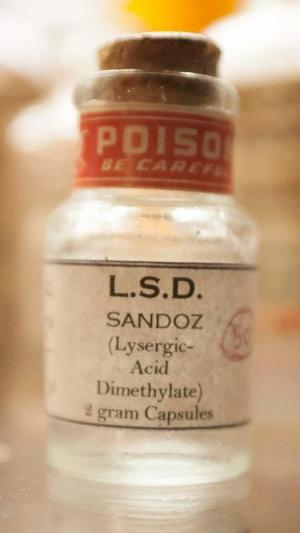One of the main movers behind Colorado's historic marijuana legalization initiative has left us.
The White House has released its drug policy priorities for its first year. It's a mixed bag.
Some Delaware dispensaries are under fire from legalization activists, South Dakota's Republican governor still wants to change the voter-approved medical marijuana law, there's progress in the South, and more.
Busy, busy, busy. Crooked pot-robbing California deputies, a pervy Pennsylvania DARE officer, a gun-stealing heroin addict Connecticut cop, and more.
DC's mayor is ready to move ahead with legalizing marijuana sales, Senate Majority Leader Chuck Schumer is ready to move ahead with federal marijuana legalization, and more.
A Louisiana Republican state representative has filed a marijuana legalization bill, an effort to advance even minor asset forfeiture reforms hits law enforcement opposition, and more.
New York police will no longer be able to search vehicles based solely on the smell of marijuana, the Montana House passes a trio of competing legalization implementation bills, a cartel massacre in Mexico leaves more than two dozen dead, and more.
Medical marijuana bills advance in several states, Virginia legalizes marijuana, a West Virginia bill to continue mandatory drug screening and testing of welfare recipients passed the House, and more.
A bill to decriminalize buprenorphine is heading for the Vermont Senate, New Zealand makes a pilot pill testing program permanent, and more.
An American citizen in Dubai faces three years in prison after testing positive for marijuana, Delaware marijuana legalization activists urge boycott of dispensaries that testified against legalization bill, and more.
A simple policy change causes a massive drop in pot arrests in San Antonio, the Maryland legislature has approved the legalization of drug paraphernalia, Vancouver sets proposed drug decriminalization quantities, and more.
Washington's governor commutes some drug possession sentences after the state's Supreme Court voids its felony drug possession law, the St. Louis County Council votes to decriminalize pot possession, the Orleans Parish prosecutors is not going to try most drug possession cases anymore and more.
A Minnesota marijuana legalization bill continues to move in the House, the acting drug czar pledges more funds for drug treatment and greater access to overdose reversal drugs, and more.
Longtime marijuana legalization activist and strategic thinker Steve Fox has died way too young. Below, we reprint verbatim the following notice from his colleagues at Vicente Sederberg, the nation's most prominent marijuana law firm:

RIP Steve Fox (Vicente Sederberg LLP)
We are truly heartbroken to share news of the passing of our partner and dear friend Steve Fox. Steve served as managing partner of VS Strategies since co-founding it in 2013, and was a leader at Vicente Sederberg LLP since its formation in 2010.
We welcome the celebration of Steve's life through the sharing of thoughts and memories, and we ask for respect and privacy for his family, friends, and coworkers who are still reeling from this loss. We have also started a GoFundMe page to support Steve's wife and daughters as they navigate their way through this extremely difficult time (Visit https://www.gofundme.com/f/support-the-family-of-steve-fox to contribute.)
With wisdom beyond his years and a pioneering spirit, Steve was an "old soul" with a knack for seeing things in a new light. He was strongly principled, deeply empathic, and fiercely kind. And despite his usually soft-spoken and lighthearted demeanor, his opinions rarely went unheard and always carried significant weight. His passion for politics and policy was exceeded only by his passion for people--his family, friends, and colleagues, as well as the multitude of strangers that he knew were being affected every day by politics and policy. He had a burning desire and uncanny ability to envision and effect positive change, both societally and in those closest to him. He was not just a remarkable human being, but a truly transformational leader.
Steve was always the first to volunteer and the last to seek credit. He was beyond generous with his time and patience, and perpetually understanding. He relished opportunities to provide counsel and guidance, and the feeling was mutual for those who received it. He was warmly regarded as a mentor by no fewer than a dozen current and former members of our firm, including all seven of us.
Steve was one of the first political professionals to enter the marijuana advocacy space. At a time when cannabis policy was just a blip on the political radar and most savvy up-and-comers were unwilling to dip a toe into the space, Steve dove in headfirst. While many viewed it as a losing cause that wasn't worth the fight, he saw it as a cause worth fighting for until it was won.
And in working to legalize and regulate cannabis for medical and adult use, he found a way to fight simultaneously for several of his core values: To promote justice and compassion, to advance freedom and liberty, and to nurture and inspire the human spirit. Humbly righteous, judiciously aggressive, and relentlessly ethical, he was committed to doing the right thing, doing it the right way, and doing whatever it takes to get it done.
When he joined the Marijuana Policy Project in 2002, Steve was the only full-time cannabis lobbyist on Capitol Hill. He would remain at the forefront of the cannabis policy reform movement for nearly two decades, playing pivotal roles in several major victories at the federal and state levels. Steve was a lead drafter of Colorado's historic Amendment 64, which legalized cannabis for adult use, and he managed all aspects of the successful campaign behind its passage and implementation.
He also conceptualized and co-founded Safer Alternative For Enjoyable Recreation (SAFER), which laid a lot of groundwork for the legalization effort and contributed to a seismic shift in the U.S. cannabis policy debate. In 2009, he co-authored the book :Marijuana Is Safer: So why are we driving people to drink," which is based on the SAFER strategy.
Long before cannabis was legalized, he envisioned a legal, organized, and responsible cannabis industry. He played leading roles in conceptualizing and establishing several of the nation's largest and most influential cannabis trade organizations, including the National Cannabis Industry Association, the Cannabis Trade Federation, and the U.S. Cannabis Council. He regularly led working group meetings and calls, and he was a frequent speaker at cannabis conferences.
Steve's role in cannabis community cannot be overstated. He was a trailblazer in the movement to end prohibition, and he was an architect and caretaker of the legal industry that is quickly replacing it. He beat the path, built the shelter, and worked tirelessly to make it as welcoming, accessible, and beneficial as possible. He always put the mission--the wellbeing of others and the betterment of society-- ahead of himself. No one was more reluctant tosing their own praises while being so deserving of a louder refrain.
In 2013, Steve received a highly esteemed award from the Drug Policy Alliance in recognition of his long-term spearheading of the Colorado legalization effort. With an audience of hundreds and the spotlight squarely on him, he used the better part of his brief acceptance speech to give recognition to the people and organizations who had supported and worked alongside him.
He reserved only the final thought for his own personal message and dedication. It was to his parents, for raising him to believe in the Jewish philosophy "Tikkun olam" to repair or heal the world through beneficial and constructive acts. That is what drove Steve to take on the cause of cannabis policy reform. And it was what drove Steve to be the person he was.
Tikkun olam. Mission accomplished, dear friend.
Shawn Hauser
Josh Kappel
Andrew Livingston
Christian Sederberg
Mason Tvert
Brian Vicente
Jordan Wellington
And the entire VSS and VS family
back to top
On April 1, the Biden administration gave us the first big hint of what its drug policy will look like as it released the congressionally-mandated Statement of Drug Policy Priorities for Year One. The result is a definite mixed bag: a heavy dose of drug prevention, treatment, and recovery, along with an acknowledgement of harm reduction and a nod in the direction of racially-sensitive criminal justice reform, but also a reflexive reliance on prohibitionist drug war policies both at home and abroad.
And nothing about the most widely used illicit drug by far: marijuana. The word "marijuana" appears not once in the heavily annotated 11-page document, and the word "cannabis" only once, in the title of an academic research paper about the onset of teen drug use in the footnotes. That's perhaps not so surprising, given that, in response to a reporter's question, Vice President Harris said last week the administration was
too busy dealing with other crises to worry about making good its campaign pledges about marijuana reform.
What is on the administration's mind is "the overdose and addiction crisis." Citing ever-increasing drug overdose deaths, the statement says "addressing the overdose and addiction epidemic is an urgent priority for [the] administration." But the solution is not to imprison drug users, with the statement noting that "President Biden has also said that people should not be incarcerated for drug use but should be offered treatment instead." (Underlying that seemingly humane approach is the errant presumption that all or most drug users are addicts in need of treatment when, depending on the drug, only between one in five and one in 10 drug users fit that dependent or problematic drug user description.)
Here are the Biden administration's drug policy priorities, all of which are gone into in detail in the statement:
- Expanding access to evidence-based treatment;
- Advancing racial equity issues in our approach to drug policy;
- Enhancing evidence-based harm reduction efforts;
- Supporting evidence-based prevention efforts to reduce youth substance use;
- Reducing the supply of illicit substances;
- Advancing recovery-ready workplaces and expanding the addiction workforce; and
- Expanding access to recovery support services.
Prioritizing treatment, prevention, and recovery is bound to be music to the ears of advocacy groups such as Faces and Voices in Recovery (FAVOR), whose own federal policy and advocacy priorities, while focusing on specific legislation, lean in the same direction. But the group also advocates for harm reduction practices the administration omits, particularly supervised consumption sites. FAVOR noted the administration's statement without comment.
As with the failure to even mention marijuana, the Biden administration's failure to include supervised consumption sites in its embrace of harm reduction -- it is wholeheartedly behind needle exchanges, for example -- is another indication that the administration is in no hurry no rush down a progressive drug reform path. And its prioritizing of supply reduction implies continued drug war in Latin America ("working with key partners like Mexico and Colombia") and at home, via support of High Intensity Drug Trafficking Areas (HIDTA) and "multi-jurisdictional task forces and other law enforcement efforts to disrupt and dismantle transnational drug trafficking and money laundering organizations." Prohibition is a hard drug to kick.
Still, naming advancing racial equity issues as a key priority is evidence that the Biden administration is serious about getting at some of the most perverse and corrosive outcomes of the war on drugs and is in line with its broader push for racial justice, as exemplified by Executive Order 13985, "Advancing Racial Equity and Support for Underserved Communities Through the Federal Government," issued on Biden's first day in office. And it is in this context that criminal justice system reform gets prioritized, although somewhat vaguely, with the promise of the creation of an "interagency working group to agree on specific policy priorities for criminal justice reform."
The Drug Policy Alliance (DPA) has some specific policy priorities for criminal justice reform, too, and they go far beyond where the administration is at. In its 2020 Roadmap for the incoming administration released in November, the group calls for federal marijuana legalization, drug decriminalization, and a slew of other criminal justice and policing reforms ranging from ending mandatory minimum sentencing and the deportation of non-citizens for drug possession to barring no-knock police raids, ending the transfer of military surplus equipment for counter-narcotics law enforcement, and dismantling the DEA. And the federal government should get out of the way of supervised consumption sites, or in DPA's politically attuned language "overdose prevention centers."
"We're glad the administration is taking important steps to address the overdose crisis -- by increasing access and funding to harm reduction services and reducing barriers to life-saving medications -- especially as people are dying at an alarming rate. We also appreciate their commitment to studying how to advance racial equity in our drug policies and best implement innovative practices on the ground. But it's clearly not enough. We need action," DPA Director of the Office of National Affairs Maritza Perez said in a statement responding to the administration's statement. "Black, Latinx and Indigenous people continue to lose their lives at the hands of law enforcement in the name of the drug war, and yet, the administration has chosen to prioritize increased funding for law enforcement. We need supervised consumption sites, not more money for police."
"And while we commend the Administration for taking steps to reduce employment discrimination, unless we address the biggest barrier for people trying to get a job -- past drug convictions and arrests -- we will still be left with significant inequities and racial disparities in the workplace," Perez continued. "It's time we get serious about saving lives and repairing the damage that has been caused by the drug war, particularly on Black, Latinx and Indigenous communities. We can start by passing federal marijuana reform and ending the criminalization of people for drugs in all forms."
Young drug reformers also had a few bones to pick with the administration's priorities. In their own statement in response to the administration, Students for Sensible Drug Policy applauded priorities such as more access to treatment and more research on racial equity, it complained that the administration priorities "fail to provide adequate support to Young People Who Use Drugs (YPWUD) in this country" -- especially those who use drugs non-problematically.
"There are no steps being taken to support YPWUD that do not want to and will not stop using drugs," SSDP said. "Young people have feared and faced the consequences of punitive drug policies and shouldered the burden of caring for their peers who use drugs for far too long. Young leaders calling for drug policy reform recognize that simply using drugs is not problematic and that we can support the safe and prosperous futures of People Who Use Drugs (PWUD) without forcing them to stop as a pre-condition for compassion, care, and opportunity."
Although only time will tell, for drug reformers, the Biden administration is looking like a step in the right direction, but only a step, and its policy prescriptions are limited by a vision of drug use rooted in the last century. Perhaps they can be pressured and prodded to plot a more progressive drug policy path.
back to top
Some Delaware dispensaries are under fire from legalization activists, South Dakota's Republican governor still wants to change the voter-approved medical marijuana law, there's progress in the South, and more.
AlabamaAlabama Medical Marijuana Bill Wins House Committee Vote. A medical marijuana bill that has already passed the Senate, Senate Bill 46, was approved by the House Judiciary Committee last Wednesday. The bill now goes to the House Health Committee before heading for a House floor vote. The bill would allow the use of marijuana by people with specified qualifying conditions.
Delaware
Delaware Marijuana Activists Stage Boycott of Medical Dispensaries That Testified Against Legalization Bill. Marijuana legalization advocates have called a boycott of four medical marijuana dispensaries after their representatives testified against a marijuana legalization bill last month. The four companies are Columbia Care, Fresh Delaware, CannTech and EZY Venture. They testified that allowing legalization would oversaturate the market, with some even talking about how it could hurt their bottom lines. The Delaware Cannabis Policy Coalition accused the companies of "simply obstructing the progress of adult-use legislation" and added that "some patients are now staging a boycott of the regulated dispensaries."
Georgia
Georgia Legislature Approves Bill to Allow Marijuana Oil Dispensaries. With a final vote in the Assembly, the legislature has passed House Bill 738, which will allow for the production and distribution of marijuana oil. The bill is now on the desk of Gov. Brian Kemp (R).
North Carolina
North Carolina Medical Marijuana Bill Filed. A medical marijuana bill with bipartisan has been filed in the Senate. Senate Bill 711, the North Carolina Compassionate Care Act, would protect doctors and patients from civil and criminal penalties for using or recommending medical marijuana and would allow the cultivation and sale of medical marijuana in the state. The bill has been referred to the Senate Committee on Rules and Operations.
South Dakota
South Dakota Governor Still Wants Changes in Medical Marijuana Program. Despite being rebuffed by lawmakers during the last legislative session, Gov. Kristi Noem (R) says she wants a special session convened to address the same proposed changes lawmakers just rejected. She wants to set the maximum number of plants grown at three, she wants the Department of Health to be the rule-making authority for the program, and she wants to bar people under 21 from being eligible to use medical marijuana.
Texas
Texas Medical Marijuana Expansion Bill Advances. A bill that would expand the state's compassionate use program for medical marijuana, House Bill 1535, has passed the House Public Health Committee. The bill would expand the program, which currently only applies to terminal cancer patients, to include other cancer patients, veterans with PTSD, and chronic pain that would otherwise be treated by an opioid.
back to top
Busy, busy, busy. Crooked pot-robbing California deputies, a pervy Pennsylvania DARE officer, a gun-stealing heroin addict Connecticut cop, and more. Let's get to it:
In Columbia, South Carolina,
a jail guard at the MacDougall Institution was arrested March 24 for allegedly conspiring with inmates to smuggle cellphone, cigarettes, and marijuana into the jail. Guard Jatuane Malik Huggins, 24, supposedly got $1,500 for his efforts, but now faces a charge of furnishing contraband to inmates. And he's been fired.
In Houston, a Harris County deputy constable was arrested last Tuesday for allegedly laundering more than $300,000 in drug money. Deputy Constable Alexander Reyes faces charges of conspiracy to distribute cocaine and possession of cocaine with intent to distribute. He's looking at 10 years to life in prison.
In Doylestown, Pennsylvania, a former Warrington Township DARE officer was arrested last Wednesday for allegedly molesting at least four boys who were in the DARE program between 1996 and 2009. James Carey, 52, is accused of molesting the boys during camping trips and at a local recreation center. He's been charged with 122 counts of involuntary deviate sexual intercourse, unlawful contact with a minor, statutory sexual assault, official oppression and related offenses.
In Fort Myers, Florida, a guard at the Charlotte Correctional Institution was arrested last Thursday for plotting to smuggle drugs into the jail. Guard Leslie Spencer, 48, allegedly agreed to smuggle three ounces of methamphetamine, three ounces of MDMA, a small amount of synthetic marijuana, and two cellphones into the prison and provide it to an inmate in exchange for a payment of $400. It was a sting operation by the FBI, and now Spencer faces a charge of attempted possession with the intent to distribute controlled substances. If convicted, he's looking at up to 20 years in federal prison.
In New York City, an NYPD officer was arrested Monday for selling weed and another, unspecified drug. Officer Catherine Soto, 31, is charged with criminal sale of a controlled substance, criminal sale of marijuana, official misconduct, criminal possession of a controlled substance and unlawful possession of marijuana, police said.
In Pensacola, Florida, an Escambia Road Prison guard was arrested Monday for allegedly smuggling drugs into the jail. Guard Byron Jermaine Banks, 29, was a camera operator at the prison and allegedly used his knowledge of the surveillance system to find blind spots where he could pass drugs to inmates. He went down after the inmate he gave drugs to got caught and gave him up. He's facing two felony counts of smuggling contraband into a detention facility.
In Greenwich, Connecticut, a former Greenwich police officer pleaded guilty Monday to stealing guns from another police department to help feed his heroin habit. In two separate incidents, Joseph Ryan, 57, stole five guns from one department and three guns from another and gave them to his dealer. He pleaded guilty to once count of possession of firearms by an unlawful user of a controlled substance. A sentencing date has not yet been set.
In Houston, a former Houston police officer was sentenced March 25 to 87 months in federal prison for stealing drugs during a traffic stop. Julissa Diaz, 41, went down during an internal affairs sting in 2017. She pleaded guilty to conspiracy to distribute cocaine.
In Los Angeles, a former LA County sheriff's deputy was sentenced Monday to seven years in federal prison for staging a fake drug raid of a warehouse and stealing more than 1,200 pounds of marijuana and $600,00 in cash. Marc Antrim, 43,pleaded guilty two years ago to five felonies, including conspiracy, possession with intent to distribute marijuana, and deprivation of rights under color of law. He also agreed to forfeit a Mercedes-Benz sedan, and cash and money orders taken in the October 2018 robbery. He is the last of six people charged in the scheme. All of the others have been sentenced to various prison sentences of up to 14 years.
back to top
DC's mayor is ready to move ahead with legalizing marijuana sales, Senate Majority Leader Chuck Schumer is ready to move ahead with federal marijuana legalization, and more.

Magic mushrooms and other natural entheogens are now deprioritized in a third Massachusetts city. (Creative Commons)
Senate Majority Leader Says Democrats Are Ready to Push Ahead on Marijuana Legalization Whether President Supports It or Not. Senate Majority Leader Chuck Schumer (D-NY) said that even though President Joe Biden (D) only supports marijuana decriminalization, "we will move forward" even if the president doesn't get on board. "He said he's studying the issue," Schumer said. "I want to make my arguments to him, as many other advocates will. But at some point, we're going to move forward, period." Schumer also clarified that: "I am personally for legalization. And the bill that we'll be introducing is headed in that direction."
Nevada Bill Would Allow for Marijuana Consumption Lounges. Assemblyman Steve Yeager (D-Las Vegas) has filed a bill that would allow for marijuana consumption lounges to operate in the state. While marijuana is legal, it is illegal to consumer it in public or in hotel rooms, and Yeager said that presents a conundrum for residents and tourists. "They can't bring it into their hotel rooms. They can't consume it outside," Yeager said. The bill, introduced Friday, is not yet available on the state legislative web site.
DC Mayor Says City is Ready to Legalize Marijuana Sales Once Congress Gets Out of the Way. Mayor Muriel Bowser (D) said last Friday that city officials are ready to move forward with implementing legal marijuana sales once Congress removes a rider that has prevented the city from doing so. "We have a tax-and-regulates scheme. We've prepared our alcohol and beverage office to be prepared to implement regulation," she said. "And we have to we have to get the hurdle of Congress out of the way."
NYPD Says You Can Now Smoke a Joint in Public. In the wake of Governor Andrew Cuomo's (D) signing marijuana legalization into effect, with the legalization of possession of small amounts in effect immediately, the NYPD has issued a memo noting that people can smoke marijuana in public anywhere they can smoke a cigarette in public. Smoking marijuana on sidewalks or front stoops is no longer "a basis for an approach, stop, summons, arrest, or search" the department memo said. But the city bans smoking in parks and at beaches, so there is no marijuana smoking allowed there, either.
Psychedelics
Third Massachusetts City Approves Psychedelic Decriminalization. Last Thursday night, the Northampton City Council approved a resolution calling for the deprioritization of drug law enforcement against natural psychedelics. Included are psilocybin, ayahuasca, and a number of other entheogenic plants and fungi. The measure passed on a unanimous vote, making Northampton the third city in the state to enact such reforms, after Somerville and Cambridge.
Drug Treatment
ACLU, NYCLU Sue New York County over Methadone Access in Prison. The ACLU and its state affiliate, the New York Civil Liberties Union filed a lawsuit Monday against Jefferson County seeking to compel the Jefferson County Correctional Facility to provide access for methadone treatment for opioid use disorder. The county bans methadone treatment for prisoners, which plaintiffs argue violates state civil rights law, the US Constitution, and the Americans with Disabilities Act.
Law Enforcement
Sentencing Commission Report Decline in Drug Prosecutions Last Year. During Fiscal Year 2020, federal prosecutors filed some 64,565 criminal cases, a decline of 15.6% over the previous year, "reflecting the impact of the COVID-19 pandemic on the work of the courts." Drug possession cases continued a five-year decline, dropping 22%, while drug trafficking cases, which had gone up slightly in Fiscal Year 2019, had declined 17% in FY 2020. The most common federal prosecutions were immigration cases, accounting for 41% of all federal prosecutions.
back to top
A Louisiana Republican state representative has filed a marijuana legalization bill, an effort to advance even minor asset forfeiture reforms hits law enforcement opposition, and more.

Tests that seek to determine impairment based on THC levels are not reliable, the NIJ reports. (Creative Commons)
National Institute of Justice Finds Field Sobriety Tests and THC Levels Are "Unreliable" Indicators of Impairment. In a report issued Monday, the National Institute of Justice found despite a growing resort toward "per se" laws that use the level of THC in bodily fluids to determine impairment, "there is little evidence correlating a specific THC level with impaired driving, making marijuana per se laws controversial and difficult to prosecute." Researchers concluded that "although THC has been proven to affect areas of the brain that control movement, balance, coordination, memory, and judgment -- skills required for safe driving -- THC levels in biofluids were not reliable indicators of marijuana intoxication for their study participants."
Louisiana Marijuana Legalization Bill Filed. State Rep. Richard Nelson (R-89) has filed House Bill 564, "for the decriminalization of marijuana and the regulation of marijuana for recreational use." The bill is a constitutional amendment, which means that if it passes out of the legislature, it would then have to be approved by voters. It is currently before the House Administration of Criminal Justice Committee.
Asset Forfeiture
Nevada Asset Forfeiture Reform Measure Facing Law Enforcement Opposition. An effort to reform the state's asset forfeiture laws has already been scaled back, but law enforcement Monday strongly opposed even the limited reforms proposed in Assembly Bill 425. The bill would make forfeiture occur at the end of a criminal case rather than forcing defendants to start a separate civil proceeding to keep their property. But law enforcement and local government interests, which derive proceeds from seized goods, are still opposed.
International
Mexico Marijuana Legalization Bill Wins Key Senate Committee Vote, Floor Vote Expected This Month. The bill that would legalize marijuana was approved Monday by the Senate Justice Committee, bringing it one step closer to a final Senate floor vote. The bill had already passed the Senate and the Chamber of Deputies but has gone back to the upper chamber to ratify amendments made in the lower chamber. It still faces two more committee votes before that final floor vote.
back to top
New York police will no longer be able to search vehicles based solely on the smell of marijuana, the Montana House passes a trio of competing legalization implementation bills, a cartel massacre in Mexico leaves more than two dozen dead, and more.

LSD and other psychedelics would be decriminalized under a bill advancing in California. (Creative Commons)
Connecticut Governor's Marijuana Legalization Bill Advances. A marijuana legalization bill supported by Governor Ned Lamont (D), House Bill 5853, passed the General Assembly Judiciary Committee on Tuesday. But lawmakers cautioned that changes are coming to the bill as it winds through the committee process. The bill awaits further action in the Senate.
Montana House Advances Three Marijuana Legalization Implementation Bills. The House on Tuesday approved three competing Republican-backed bills for regulating legal marijuana after voters approved it in November. The bills all departed from the voter-approved initiative, which called for legal sales to begin next January and for many revenues to be used for conservation efforts. Republican legislative leaders urged lawmakers to approve all three, arguing that doing so would give the Senate more options as it considers its course of action.
New York Police Will No Longer Be Able to Search Vehicles Solely Because of the Smell of Marijuana. With the legalization of marijuana possession now in effect, police in the state will no longer be able to search vehicles based solely on the smell of weed. More than three ounces of marijuana -- the personal possession limit -- will have to be visible to create the probable cause required to do a search. "While law enforcement across the state are continuing to review and discuss the ramifications of the new laws, what is clear is the fact we cannot search vehicles based on the odor of cannabis or even witnessing small quantities of cannabis," said Chautauqua County Sheriff James Quattrone.
New Orleans City Council to Take Up Marijuana Decriminalization Resolution. Council President Helena Moreno and five council members have filed a resolution to support an effort in the state legislature to decriminalize marijuana possession in the state. "This is just common sense at this point, from criminal justice reform to job creation to funding critical needs," said Moreno. "It addresses a fundamental source of racial and economic inequity in our criminal justice system. Public support for decriminalization is finally catching up to the truth: black and brown communities bear the brunt of marijuana enforcement, disrupting lives and reinforcing existing biases while failing to make any appreciable effect on public safety. And because of this reality, the taxation piece must be a thoughtful one. Investment in communities of color must be prioritized… Let's do this, the time is now."
Psychedelics
California Psychedelic Decriminalization Bill Advances A bill that would decriminalize the use and possession of several psychedelic drugs, Senate Bill 519, passed its first legislative hurdle Tuesday as it won approval in the Assembly Public Safety Committee. It now heads for the Assembly Health Committee before going for an Assembly floor vote. "By decriminalizing we're not inviting people to use. We're taking, instead of a criminal approach to drug use, a health-minded approach," bill sponsor state Sen. Scott Wiener (D-San Francisco) told the committee before the vote.
Harm Reduction
Nevada Naloxone in Schools Bill Advances. A bill to allow schools to get overdose reversal drugs has passed the Assembly Health and Human Services Committee. The measure, Assembly Bill 205, amends an existing law allowing school officials to have Epi-Pens on hand to prevent anaphylactic shock to add auto-injector devices containing drugs such as naloxone.
Vermont Buprenorphine Decriminalization Bill Advances. The House Human Services Committee on Tuesday approved House Bill 225, which would decriminalize the possession of small amounts of the opioid-addiction medication buprenorphine. The bill passed unanimously in committee and now heads for a House floor vote.
International
Mexico Marijuana Legalization Bill Wins Second Committee Vote in As Many Days. The Second Legislative Studies Committee approved a rapidly-advancing marijuana legalization bill Tuesday, one day after it won approval in the Justice Committee. It must still get through the Health Committee, which could happen as early as Wednesday, clearing the way to a final Senate vote as early as Thursday.
Mexico Cartel Massacre Leaves 27 Dead in Michoacan. The Jalisco New Generation Cartel (CJNG) is being blamed for the mass killing of rival gang members in the municipality of Aguililla, Michoacan, last week. The Citizens' Intelligence Unit said that member of United Cartels had surrendered to the CJNG and were subsequently executed. And now, someone has stolen 26 of their bodies and eight decapitated heads from the local morgue.
back to top
Medical marijuana bills advance in several states, Virginia legalizes marijuana, a West Virginia bill to continue mandatory drug screening and testing of welfare recipients passed the House, and more.

California could see pilot safe injection site programs if a bill in the state Senate passes. (vch.ca)
Virginia Legalizes Marijuana. With a tie-breaking vote by Lt. Gov. Justin Fairfax (D), the state Senate on Wednesday gave final approval to Senate Bill 1406, which legalizes marijuana in the state. The legislature also approved amendments by Gov. Ralph Northam (D) that included moving up the date of the legalization of pot possession from 2024 to this coming July. Virginia now becomes the 16th state to have legalized marijuana (New Mexico has passed a bill but it has not been signed into law yet.)
Medical Marijuana
Alabama Medical Marijuana Bill Wins House Committee Vote. A medical marijuana bill that has already passed the Senate, Senate Bill 46, was approved by the House Judiciary Committee Wednesday. The bill now goes to the House Health Committee before heading for a House floor vote. The bill would allow the use of marijuana by people with specified qualifying conditions.
Georgia Legislature Approves Bill to Allow Marijuana Oil Dispensaries. With a final vote in the Assembly, the legislature has passed House Bill 738, which will allow for the production and distribution of marijuana oil. The bill is now on the desk of Gov. Brian Kemp (R).
South Dakota Governor Still Wants Changes in Medical Marijuana Program. Despite being rebuffed by lawmakers during the last legislative session, Gov. Kristi Noem (R) says she wants a special session convened to address the same proposed changes lawmakers just rejected. She wants to set the maximum number of plants grown at three, she wants the Department of Health to be the rule-making authority for the program, and she wants to bar people under 21 from being eligible to use medical marijuana.
Texas Medical Marijuana Expansion Bill Advances. A bill that would expand the state's compassionate use program for medical marijuana, House Bill 1535, has passed the House Public Health Committee. The bill would expand the program, which currently only applies to terminal cancer patients, to include other cancer patients, veterans with PTSD, and chronic pain that would otherwise be treated by an opioid.
Hemp
Idaho Legislature Approves Hemp Bill. With a final vote in the Senate Wednesday, the legislature approved a bill to legalize hemp production in the state, House Bill 126. The bill is now on the desk of Gov. Brad Little (R). Idaho is the only state that has yet to legalize hemp production.
Drug Testing
West Virginia House Approves Bill to Extend Drug Testing Requirement for Welfare Recipients. The House of Delegates on Wednesday approved Senate Bill 387, which would keep in place a requirement that first time applicants of TANF (Temporary Assistance for Needy Families) pass a drug test if a drug screening suggests they may be drug users. The Senate version of the bill would only extend the program for one year, so the bill is going to have to go back to the Senate to resolve the difference.
Harm Reduction
California Bill to Allow Safe Injection Site Pilot Programs Wins Committee Vote. The Senate Public Safety Committee on Wednesday approved Senate Bill 57, sponsored by Sen. Scott Weiner (D-San Francisco). The bill would legalize safe injection sites as pilot programs in Los Angeles County, Oakland, and San Francisco. The bill still needs to be approved by the Senate Health Committee and Senate Judiciary Committee before heading for a Senate floor vote. If passed, it may have to overcome federal hurdles too.
back to top
A bill to decriminalize buprenorphine is heading for the Vermont Senate, New Zealand makes a pilot pill testing program permanent, and more.

A deadly amount of fentanyl. The White House has approved federal funds for test strips to prevent overdoses. (DEA)
Biden Administration Allows Federal Funds to Be Used to Buy Rapid Fentanyl Test Strips. The Centers for Disease Control and Prevention (CDC) and the Substance Abuse and Mental Health Services Administration (SAMSHA) announced Thursday that federal funds can now be used to purchase rapid fentanyl test strips. According to a press release, organizations previously awarded funding through the CDC's Overdose Data to Action cooperative agreement program can use funds to purchase the test strips. SAMSHA grants can be used to buy the strips so long as doing so aligns with "the purpose of the grant," a CDC spokesperson explained. "This is a major step forward in the ongoing and critical work to prevent overdose and connect people who have substance use disorders to evidence-based treatment options," said Tom Coderre, the interim leader at the Substance Abuse and Mental Health Services Administration (SAMSHA). "This will save lives by providing tools to identify the growing presence of fentanyl in the nation's illicit drug supply."
Vermont House Approves Bill Decriminalizing Buprenorphine. The House on Thursday voted overwhelmingly to approve House Bill 225, which would decriminalize the possession of small amounts of buprenorphine, a drug used to treat opioid dependence. The bill would people to possess up to 224 milligrams of the drug -- about two weeks' worth -- even if they don't have a doctor's prescription. The bill now heads to the Senate.
International
Mexico Marijuana Legalization Bill Hits Last-Minute Snag, Another Extension May Be Sought. The bill, which is just a Senate vote away from passage after being approved in the Senate and then amended in the Chamber of Deputies, has run into opposition from senators unhappy with the revised version of the bill. Senate Majority Leader Ricardo Monreal said Thursday he may seek an extension of the Supreme Court's latest deadline to end marijuana prohibition, which the court has held is unconstitutional. Under the current deadline, lawmakers only have until the end of the month to get it done. Now, action could be delayed until the legislature meets again in September.
New Zealand Makes Pill Testing Program Permanent. Pleased with the results of a one-year pilot program to allow drug users to get their drugs tested without penalty, the government of Prime Minister Jacinda Ardern announced Friday that it is making the program permanent. During the pilot program, nearly half of all samples tested contained contaminants, with cathinones being especially common in pills marketed as MDMA. The pill (or powder) testing has most commonly taken place at music festivals.
back to top
An American citizen in Dubai faces three years in prison after testing positive for marijuana, Delaware marijuana legalization activists urge boycott of dispensaries that testified against legalization bill, and more.

Tijuana street scene. The State Department has issued a travel warning because of cartel violence. (Creative Commons)
Delaware Marijuana Activists Stage Boycott of Medical Dispensaries That Testified Against Legalization Bill. Marijuana legalization advocates have called a boycott of four medical marijuana dispensaries after their representatives testified against a marijuana legalization bill last month. The four companies are Columbia Care, Fresh Delaware, CannTech and EZY Venture. They testified that allowing legalization would oversaturate the market, with some even talking about how it could hurt their bottom lines. The Delaware Cannabis Policy Coalition accused the companies of "simply obstructing the progress of adult-use legislation" and added that "some patients are now staging a boycott of the regulated dispensaries."
Drug Testing
Mississippi Ban on Sale of Urine, Fake or Real, to Beat Drug Tests Signed into Law. Gov. Tate Reeves (R) signed into law Senate Bill 2569 last Friday. The bill makes it a crime to sell, market, or give away real or fake human urine to produce negative results on a drug test. A first offense can earn up to six months in jail, with a second offense earning up to a year and a third offense earning up to three years in prison.
Law Enforcement
Maryland Passes Sweeping Police Reform Legislation. Overriding a veto by Gov. Larry Hogan (R), the legislature last Saturday passed a package of three bills -- Senate Bill 71, Senate Bill 178, and House Bill 670 -- that restrict the use of no-knock warrants, limits police officers' use of force, and repeals the country's first Bill of Rights for law enforcement. Passage of the package was impelled by the nationwide protests that followed the death of George Floyd in police custody. "This is what the community wants -- they want reform, they want transparency, and they want accountability," said Caylin A. Young, public policy director of the ACLU of Maryland, which was part of a coalition of 90 groups that had backed the bills. "There needs to be a reimagining of what policing in Maryland looks like."
International
US Citizen Detained in Dubai for Marijuana-Positive Drug Test. An American man who was hospitalized in Dubai for an attack of pancreatitis and who subsequently tested positive for marijuana at the hospital has been detained for violating the drug laws of the United Arab Emirates, which consider a positive drug test as equating with possession. Peter Clark, 51, had smoked marijuana in Las Vegas before flying to Dubai. He was jailed for three days in foul conditions before being released to a hotel. He is facing up to three years in prison.
State Department Issues Travel Alert for Tijuana, Mexicali Valley. The US Embassy in Mexico City has issued a security alert warning citizens to take care when traveling in Tijuana and the nearby Mexicali Valley because of violent conflict between drug trafficking groups in Tijuana. "Travelers should exercise extra caution when traveling in and around Mexicali, the Mexicali Valley, and the western part of the state of Sonora due to the potential for increased violence between rival cartel factions. Members of the embassy community have been warned to avoid the Mexicali area until further notice," the US embassy said. The Sinaloa Cartel is attempting to fend off a takeover attempt of the Tijuana plaza by the Jalisco New Generation Cartel (CJNG), which has recently threatened the state governor and members of his cabinet.
back to top
A simple policy change causes a massive drop in pot arrests in San Antonio, the Maryland legislature has approved the legalization of drug paraphernalia, Vancouver sets proposed drug decriminalization quantities, and more.

New Mexico becomes the latest state to legalize marijuana, and the third in the past few weeks. (Creative Commons)
Minnesota Marijuana Legalization Bill Advances Again. A marijuana legalization bill, House File 600, passed a fifth House committee Monday. The bill was approved by the House Environment and Natural Resources Finance and Policy Committee on an 11-7 vote. It now heads to the House Judiciary Finance and Civil Law Committee, which is scheduled to take up the measure on Wednesday.
New Mexico Legalizes Marijuana. With the signature Monday of Gov. Michelle Lujan Grisham (D) on a marijuana legalization bill, House Bill 2, New Mexico has legalized marijuana, becoming the 17th state to do so, the third to do so in the past few weeks, along with New York and Virginia, and the seventh to do since last November's elections.
San Antonio Pot Prosecutions Down 99% Since 2018. Under a cite and release policy instituted by Bexar County District Attorney Joe Gonzales (D), the number of people arrested for marijuana possession has dropped dramatically. In 2018, the DA's office prosecuted 4,515 misdemeanor marijuana possession cases, but in 2020, that number had dropped to 15. That's a 99.6% decrease.
Drug Policy
Biden Names Criminal Justice Reform Advocate Anne Milgram to Head DEA. President Joe Biden (D) has selected former New Jersey attorney general Anne Milgram, a longtime criminal justice system reform advocate, to head the Drug Enforcement Administration (DEA), the White House said Monday. The agency has been without a Senate-confirmed leader since the Obama administration.
Maryland Legislature Approves Bill to Legalize Drug Paraphernalia. The General Assembly on Monday approved a bill to legalize the possession of drug paraphernalia, Senate Bill 420. The bill has already passed the Senate, so it now heads to the desk of Gov. Larry Hogan (R). The House passed the bill by a veto-proof margin, but the Senate tally was one short of the number needed to override a veto.
Sentencing
California Bill to End Mandatory Minimums for Drug Offenses Passes Senate. A bill that seeks to end mandatory minimum sentences for nonviolent drug offenders, Senate Bill 73, passed the Senate Monday on a 25-10 vote. The bill now heads to the California State Assembly.
International
Vancouver Outlines Personal Possession Amounts for Drug Decriminalization Proposal. As part of its application to Health Canada for a federal exemption from federal drug laws to decriminalize drug possession in the city, Vancouver has outlined its recommendations for what amounts should be decriminalized. The city is recommending the decriminalization of one gram or 10 rocks for crack cocaine, 1.5 grams for amphetamines, two grams for opioids such as heroin and fentanyl, and three grams for cocaine. Mayor Kennedy Stewart said Monday the goal is remove criminal penalties and reduce stigma by focusing on a health-centered approach.
back to top
Washington's governor commutes some drug possession sentences after the state's Supreme Court voids its felony drug possession law, the St. Louis County Council votes to decriminalize pot possession, the Orleans Parish prosecutors is not going to try most drug possession cases anymore and more.

There's a move afoot in Congress to finally end the sentencing disparity between crack and powder cocaine.
Connecticut Poll Finds Strong Support for Marijuana Legalization, Expungement. As legislators ponder whether to make Connecticut the next state to legalize marijuana, a new poll from Sacred Heart University shows strong popular support for the move. The poll had support at 66%, with 62% saying that if marijuana is legalized, those with prior marijuana convictions should have their records expunged.
St. Louis County Council Votes to Decriminalize Pot Possession. The council Tuesday night approved a resolution reducing the penalty for possessing less than 35 grams of marijuana to a fine of less than $100. The previous penalty had been up to a year in jail and a $1,000 fine.The Maplewood City Council also passed legislation Tuesday night to decriminalize marijuana possession.
Medical Marijuana
North Carolina Medical Marijuana Bill Filed. A medical marijuana bill with bipartisan has been filed in the Senate. Senate Bill 711, the North Carolina Compassionate Care Act, would protect doctors and patients from civil and criminal penalties for using or recommending medical marijuana and would allow the cultivation and sale of medical marijuana in the state. The bill has been referred to the Senate Committee on Rules and Operations.
Drug Policy
Orleans Parish District Attorney Will No Longer Charge Small-Time Drug Possession Offenses, Except for Heroin and Fentanyl. The Orleans Parish District Attorney's office has adopted a policy of refusing to prosecute charges for possession of small amounts of drugs. New Orleans police may continue to arrest people for small-time possession, but they will not be prosecuted for "an amount intended for personal use." But there is one big exception: Heroin and fentanyl charges will continue to be prosecuted.
Pardons and Commutations
Washington Governor Commutes Sentences After Felony Drug Possession Law Thrown Out. In the wake of a state Supreme Court decision voiding the state's felony drug possession law, Gov. Jay Inslee (D) announced Tuesday that he had commuted the sentences of 13 prisoners who were incarcerated on drug possession charges. More commutations are coming, his office said.
Sentencing
Coalition Asks Judiciary Committee Chairs to Eliminate Crack-Powder Cocaine Sentencing Disparity. More than two dozen think tanks and advocacy groups from across the political spectrum have banded together to call on the chairs and ranking members of the House and Senate Judiciary committees to end the crack-powder cocaine federal sentencing disparity by passing Senate Bill 71, the EQUAL Act. Sponsored by Sen. Cory Booker (D-NJ), the bill would eliminate the sentencing disparity between crack and powder cocaine and make that change retroactive.
Biden Administration Supports Temporary Extension of Ban on Fentanyl Analogues. The Justice Department said Monday it would support a bill that would extend a temporary ban on fentanyl analogues for another seven months. The Trump-era ban is set to expire next month without action by Congress. The department said it would "work with Congress to seek a clean, seven-month extension to prevent this important law enforcement tool from lapsing." The move has been opposed by criminal justice reform groups some researchers, who worry it could incite mass incarceration and make research more difficult. The department acknowledged these concerns, saying it intends to "address legitimate concerns related to mandatory minimums (prison terms) and researcher access to these substances."
Public Health
Drug Overdoses Hit Record High During Pandemic. Preliminary data from the Centers for Disease Control and Prevention (CDC) show that more than 87,000 people died of drug overdoses in the 12-month period that ended in September. That's the largest number for any year since the opioid epidemic began in the mid-1990s. The biggest jump in deaths took place in April and May, in the depths of pandemic lockdowns and attendant fear and stress.
back to top
A Minnesota marijuana legalization bill continues to move in the House, the acting drug czar pledges more funds for drug treatment and greater access to overdose reversal drugs, and more.

Coca and cocaine are on the mind of the Colombian government this week. (Pixabay)
Quinnipiac Poll Has Record High Support for Marijuana Legalization. A new Quinnipiac University poll has support for marijuana legalization at 69%, the highest number ever reported in the poll. That's an increase of 18 points since Quinnipiac first polled the question in 2012. There was majority support for legalization in every demographic group, even people over 65 (51%) and Republicans (62%).
Minnesota Marijuana Legalization Bill Wins 6th Committee Vote. A marijuana legalization bill, House File 600, won a sixth House committee vote Wednesday in the Judiciary Finance and Criminal Law Committee. It now goes to the State Government Elections and Finance Committee.
Drug Treatment
Acting Drug Czar Pledges to Expand Drug Treatment as Overdose Deaths Rise. Regina M. LaBelle, acting director of the White House Office of National Drug Control Policy (ONDCP -- the drug czar's office) told House lawmakers Wednesday the administration is moving to muster significant federal resources to close gaps in drug treatment availability and make overdose reversing medications more available. She noted that the administration last week submitted its proposed budget to Congress, which included more than $10 billion for addiction programs, an increase of 57% from current funding levels.
Psychedelics
California Psychedelic Decriminalization Bill Wins Another Committee Vote. The Senate Health Committee voted 6-2 Wednesday to a bill to decriminalize the possession of a variety of psychedelics, Senate Bill 519. The legislation sponsored by Senator Scott Weiner (D-San Francisco) now heads to the Senate Appropriations Committee.
International
Colombia Government Issues Decree Setting the State for Resumption of Aerial Fumigation of Coca Crop. In a joint message this week, Justice Minister Wilson Ruiz and Defense Minister Diego Molano announced Presidential Decree 380, which sets guidelines for the "program for the eradication of illicit crops by aerial spraying." While ministers clarified that the framework "does not automatically reactivate the Program," it is another step in Conservative President Ivan Duque's long-desired effort to reactivate the program, which was halted by former President Juan Manuel Santos in 2015 after the World Health Organization (WHO) deemed it "probably carcinogenic to humans."
Colombia Congress Debates Bill to Regulate Coca and Cocaine. The Congress has begun debate on a bill that would regulate coca and its derivatives. The bill is from two opposition parties, the Green Alliance and the Indigenous and Social Alternative Movement (MAIS). "Ending the drug trafficking business implies turning drug trafficking into a bad business for the mafias, and this is achieved by regularizing the business by the State. Let's remove it from the logic of violence," said Liberal Senator Luis Fernando Velasco. The debate continues.
back to top












